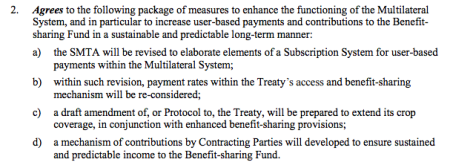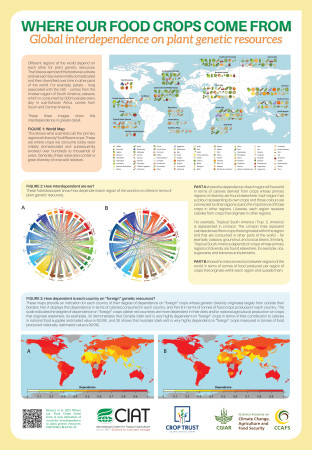The Plant Treaty is having its sixth Governing Body meeting next week in Rome. Perhaps the main thing on the agenda is discussion of the recommendations of the Ad-hoc Open-ended Working Group to Enhance the Functioning of the Multilateral System. The full draft resolution is online. But here’s the money quote:

I’ll be there and will try to post on the deliberations as they happen. If I can’t do that, I’ll let you know what happened after the event. There’s also a full complement of side events. Our friend Colin Khoury will be presenting his research on “Where our Food Crops Come from: A new estimation of countries’ interdependence in plant genetic resources.” You can find out more from CIAT. Whose comms machine has also come up with a cool poster.

As a vast part of the materials covered by SMTAs are coming out of CIMMYT and are material under development, then the CGIAR should impose – as it can – further conditions on distribution. Start with a tax of 1% of crop production (not, as under the Treaty, seed production), assess contributions by country of origin, (not this silly MLS), and ensure this gets paid directly to the country of origin pro rata to the contribution to the bred variety. At least Mexico will benefit from its vast contribution of varieties to CG genebanks rather than being left out in the cold, as now under the Treaty.
You could also ration verbal contributions to the GB debates relating to the sample contribution countries make to the Treaty. Mexico – not a Treaty member – could get 15% or so time from its contribution to the Treaty via the CG genebanks and the USDA collections. Or perhaps the CG could get 90+% time from its contributions as measured by SMTAs.
If the Treaty GB doesn’t get it right this time, the Treaty should fold up: there are better ways.
That CIAT poster is the bomb!
First reports from IISD of that meeting in Rome with the long name: “Visser mentioned activities under the Funding Strategy, including the first repatriation of seed materials from the Global Seed Vault to the International Center for Agricultural Research in the Dry Areas (ICARDA) to replace accessions lost during the Syrian civil war.” Is the the `whole truth’: reports from ICARDA indicate that samples have not been `lost’ – in fact are duplicated all over the place. And why should this transaction require Treaty funding (through the Crop Trust?). As ICARDA wants the stuff back it can pay itself.
This is all going to be another Treaty-associated mess.
The first report from the IISD of the plenary GB6:
“Frank Rijsberman, Chief Executive Officer, CGIAR Consortium, outlined achievements of the Global Crop Diversity Trust, and outlined the process of developing “scuba rice,” a new extreme flood-tolerant rice variety.”
Who is this guy supposed to be batting for?
And scuba rice is old hat – it’s been in the field for years.
I have now found the text of Frank’s speech to the GB6 [CGIAR News]. It does not “outline the achievements of the Global Crop Diversity Trust” as claimed by the IISD report (unless Frank was ad-libbing). It does however state that: “the CGIAR Fund has approved a follow-on proposal to commit an additional $93 million for a second phase of this program for the period 2017-2021”. Frank not specify that the Crop Trust will implement this proposal: my information is that things are on hold pending a review.
Frank goes on with the killer: “CGIAR Centers are responsible for approximately 94% of all materials transferred globally using the Standard Material Transfer Agreement (SMTA).” With this phenomenal record the CGIAR can and should walk away from the failed Treaty and implement a far more responsible and equitable benefit-sharing system (in addition to the vast benefits in kind already enjoyed by CG partners from plant breeding and varietal distribution). The Treaty is now a millstone round the neck of global genetic resource management.